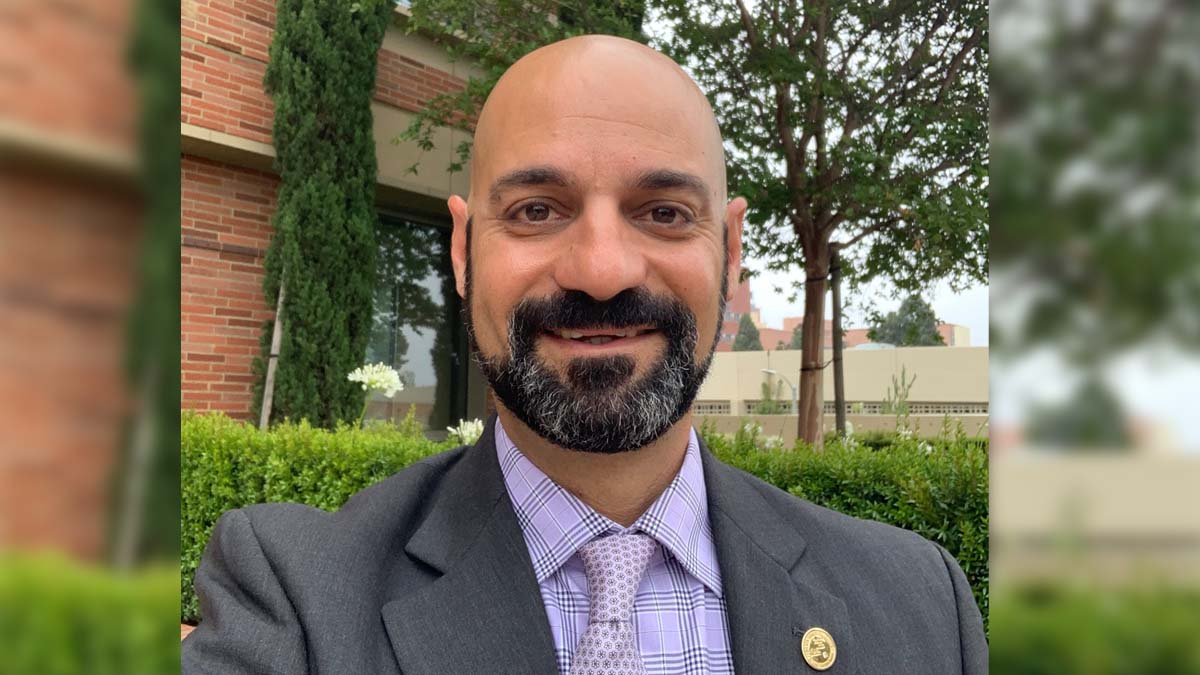STUDENT SPOTLIGHT: Breaking Concrete to Grow Roses

For Nader Twal, access to a quality, equitable education is not an abstract concept. Nor is it something to ever take for granted.
The American-born son of Jordanian immigrants spent part of his youth in Saudi Arabia, where his father Imad worked as a civil engineer. At the time, educational opportunities for women were highly restricted, but his mother Nahida was not to be denied. He watched her dedicate years to completing mail-in correspondence courses that allowed her to achieve her goal of a college degree.
“She was so determined,” Twal recalls. “It was burned into our heads that education mattered. Do whatever you had to do to get educated. So any investment in making sure people are learning is something that excites me.”
Investing in educators has been Twal’s calling for more than a decade. As a program administrator in the Long Beach Unified School District, he builds systems of teacher professional learning — a role that the former classroom teacher says has magnified his ability to make meaningful impacts.
He also recently made another investment in his own education. Twal is currently a doctoral student in San Diego State University’s Ed.D. program in educational leadership (PK-12 concentration), part of an inaugural cohort made up of administrators from his district.
It’s an investment he hopes will help amplify his voice as an agent of large-scale systemic change.
An Equity Lens
Twal is a firm believer that school district central offices are more than just a mechanism to deliver funding. They can be units of change themselves.
His passion — and the subject of his dissertation — is the implementation of a concept called Liberatory Design, an approach to fostering equity and change within complex systems that shifts the power dynamic between those who hold power and those impacted by it.
"The analogy I always use is, people see a rose come up through a crack in the sidewalk, and everybody says, ‘See it's possible — let's go study how that rose broke through the concrete and see if we can get others to do it,’” Twal said. “What I'm wondering is, why is the concrete even there if we're trying to get roses to grow? The area where we're planting the seeds should be designed for them to flourish, not be the exception.
“And for that to happen systems must change.”
Working in a diverse district in Long Beach since 1998 has helped focus his own equity lens, but his own experience being affected by systems of oppression have also been instructive.
In Saudi Arabia, where his family was barred from practicing its Christian faith, he looked like a member of the dominant culture but did not fit in. While he received a Western education in international schools, he was often the subject of anti-Arab racial slurs from his American classmates. And upon returning to America at age 13 — right around the time of the first Gulf War — his feeling of being treated as “other” only intensified.
"The U.S. is home; This is where I was born and this is much of the culture that I've adopted,” Twal said. “But because of my experiences, I always have a very keen sense and sensitivity for who's at the margin. So trying to bring people from the margin and into the center, and trying to amplify not just their voice but their contribution in a meaningful way, really drives a lot of how I see my work.
“Even if it's not the focus of my work, it's the lens I use to do the work."
A Seat at the Table
Twal said his experience in SDSU’s doctoral program has been “a blessing.” He has particularly appreciated the support, encouragement and accessibility offered by the professors — a stark contrast to the cut-throat weeding-out process he was expecting.
“Once you're in the program, there's deep care in shepherding us to a meaningful dissertation that is defensible, that we feel good about and that is actually making a meaningful contribution to the field,” he said. “That has completely fueled me.”
"The tension I feel is that I don't think you need a title to matter and I don't think you need a degree to contribute,” he added. “But I also understand that the world and the society that we function in recognizes titles and recognizes education. This might be a little subversive, but if a degree can get me to certain tables with credibility that that table will accept, then that's great — we can make change for education.”
Twal already has a seat at a very big table. In December, he was elected to the board of trustees for Learning Forward, an international organization focused on teacher learning that he’s collaborated with for nearly a decade.
Twal became involved with Learning Forward in 2013 as part of a Gates Foundation Innovative Professional Development (iPD) grant. In 2018, he and colleagues launched myPD Unplugged, a podcast series offering perspectives on educator teacher development that spanned four seasons and garnered tens of thousands of streams. Then in 2022, he authored a regular column in The Learning Professional, a professional journal associated with the organization.
When he got news he would be joining the board, he admits his imposter system kicked in — but he’s excited for the challenge.
"A friend of mine said God doesn't call the equipped, God equips the called,” he said. “I'm excited. I'm nervous. I'm thrilled. I love this organization so to be able to invest now in teacher learning internationally is unbelievable — what a gift."

